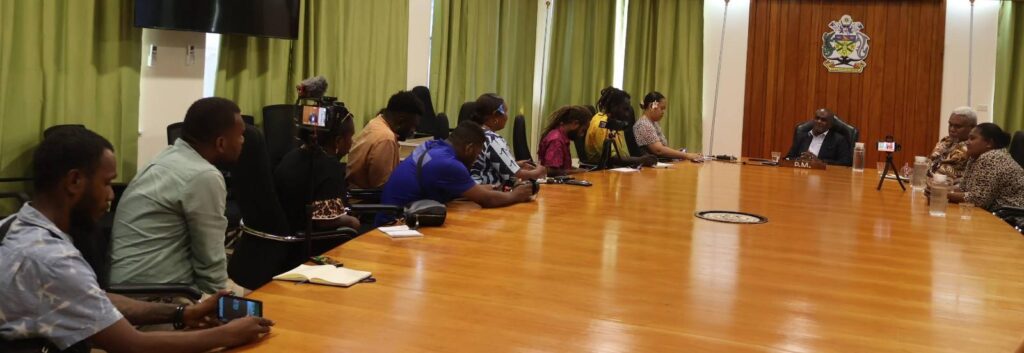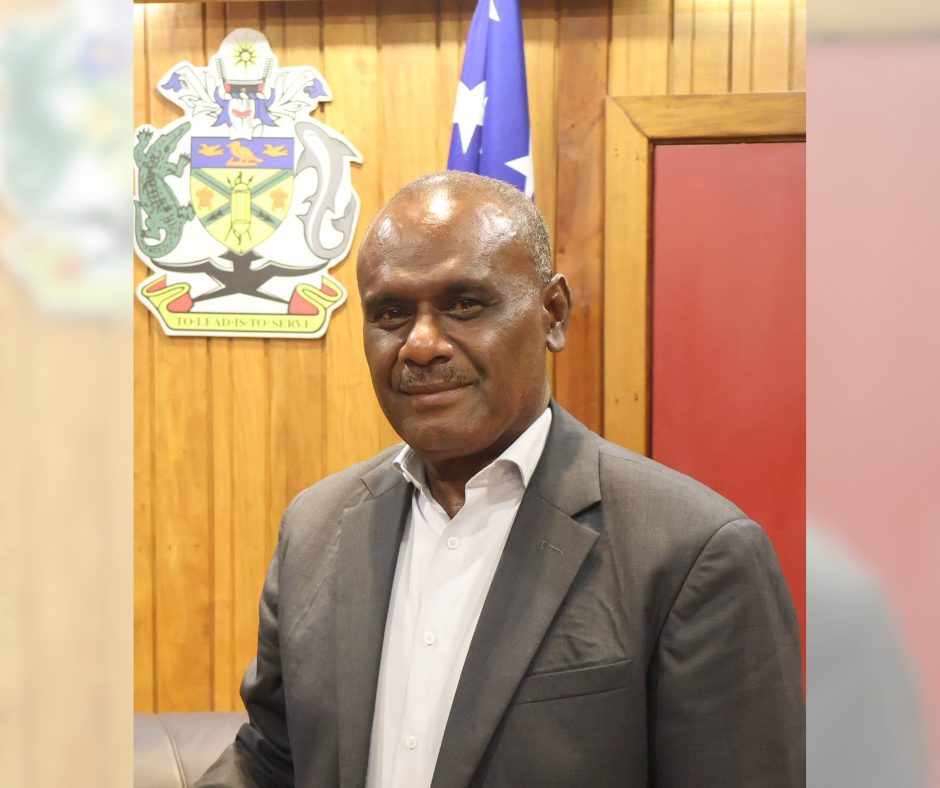Solomon Islands Prime Minister, Jeremiah Manele is setting a clear example for transparent governance in the Pacific.
Manele hosts a press conference twice every month, to brief journalists on the government’s latest activities, policies, and plans.
It is a commitment, he says, reflects his administration’s view of the media as a vital bridge between government and citizens.
“It’s important in terms of transparency and accountability,” Manele told InsidePNG and In-depth Solomons in an exclusive interview.
“It’s an opportunity where we can inform our people through the media on the implementation of government programs, policies, activities, even upcoming visits or the outcome of those we’ve undertaken.”
A Positive Shift from Past Leadership
His approach has been praised as a welcome departure from previous leadership styles.
“Manele’s decision to face the media and field questions from journalists is a huge step towards open government, transparency and accountability,” said Ofani Eremae, President of the Media Association of Solomon Islands (MASI).
“This is something that had been missing under the last leadership of Manasseh Sogavare,” he added.
“Regionally, I think Manele’s approach aligns more closely with norms seen in countries like Papua New Guinea, where Prime Minister James Marape holds media engagements, though sometimes more sporadically.”
Solomon Islands Broadcasting Corporation’s News and Current Affairs editor Fredrick Kusu said the fortnightly press conferences are welcome news for journalists in Solomon Islands.
“The decision to conduct regular press conferences with journalists is a positive development because it allows journalists to ask questions about governance directly to the Prime Minister,” Kusu said.
“This transparency enables the public to stay informed about what is happening in the country, especially at the government level,” he added.

Countering the Rise of Misinformation and AI Manipulation
This practice is rare among regional leaders and comes at a time when AI-generated fake content and disinformation campaigns are rife online.
“What goes out to our people must be factual and true,” Manele said. “Misinformation can be a source of instability and disunity.”
Eremae agrees.
“Journalists must treat the challenge of disinformation and AI-generated content as both a professional and civic duty, adapting their skills and vigilance to protect truth, democracy, and public trust,” he emphasized.
“Our member organisations are aware of these challenges and have internal mechanisms to safeguard their content.”
PNG Media Calls for Greater Access and Structure
In neighbouring Papua New Guinea, media leaders have also recognised the need for more structured engagement with the government.
“PNG government leaders and state agency heads would benefit more from a robust and direct engagement with the media,” said Neville Choi, President of the Media Council of PNG (MCPNG).
“Transparency and accessibility are important to get their message out to the people, which is why the media continues to push for more in-person conferences and open communication.”
He added that while PNG has media access channels, much of it is informal and reliant on personal relationships with officials; a system that lacks consistency.
“Much of the access comes through direct contact with particular journalists or through government media units, and when the PM decides to hold an in-person media conference,” Choi said.
Information Access with a Responsible Framework
Access to government information in Solomon Islands is guided by its commitment to freedom of expression, though some limitations apply based on subject sensitivity according to PM Manele.
Once cabinet conclusions are formally adopted, journalists could approach the relevant ministries for further details.
“It depends on the nature of the subject,” Manele noted. “Some issues, particularly those related to national or international security, are understandably sensitive.”
MASI has been working to ensure that journalists are well equipped to handle such responsibilities professionally.
“One of MASI’s goals is to ensure the media acts responsibly and ethically,” said Eremae. “But government authorities also have a responsibility to provide reporters with information when it is requested. That’s how fair and balanced reporting happens.”
Building Journalistic Capacity and Awareness
Both MASI and MCPNG are actively strengthening their respective media sectors through training and advocacy.
“The MCPNG is currently supporting the roll-out of the Foundations of Journalism training program,” said Choi. “This training is an extremely effective mechanism which will bridge a perceived gap between the journalism knowledge and principles in media training schools, with skills received on the newsroom floor.
“We’re also compiling a discussion paper on AI and its implications for PNG’s media,” Choi added.
“There is a clear need for newsroom leaders to better understand AI tools and risks, especially as we approach the 2027 elections.”
Foreign Policy and Media in a Multipolar Pacific
On regional dynamics, PM Manele reiterated Solomon Islands’ “friends to all” policy.
In a landscape where global powers are increasingly vying for influence across the Pacific, including through media initiatives, he emphasized that his government remains focused on partnerships that advance national development.
“We are friends with Australia, China, the US, Japan, everyone. Our interests are developmental.
“We’re a geographically spread country with major infrastructure, health, and education challenges. So, we work with all partners to meet those needs.”
Collaboration Across Borders: A Shared Media Mission
As cross-border issues like environmental crime, organized corruption, and digital manipulation grow, both MASI and MCPNG say newsroom collaboration is crucial.
“Many of today’s biggest stories; corruption, organized crime, environmental destruction, do not stop at national borders,” Eremae said.
“Working together across the region helps expose these issues and strengthens journalism overall.”
“Collaborations like that of InsidePNG and In-depth Solomons foster exchange, deepen understanding of local contexts, and improve the quality of reporting,” said Choi.
“These efforts also make it harder for misinformation or criminal networks to escape scrutiny across jurisdictions.”
An InsidePNG and In-depth Solomons Collaboration.


Comments are closed.